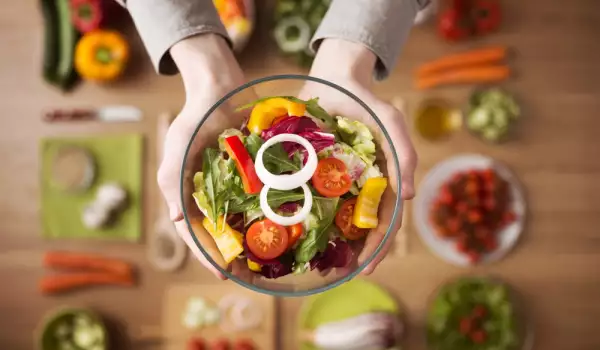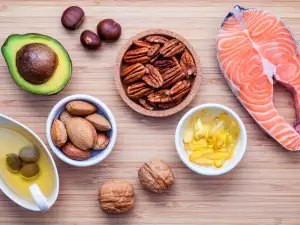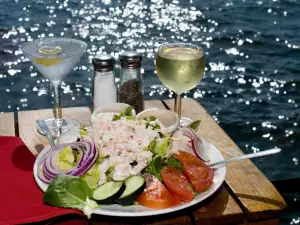Breastfeeding is the best choice for feeding the baby. Mother's milk during the first 6 months of a newborn's life provides all the nutrients, fluids and energy it needs for its growth and development.
In addition, breast milk provides immune bodies from the mother, which protect the baby from a large number of infections and help it recover faster after illness.
Breastfeeding reduces the risk of autoimmune diseases and childhood obesity. Last but not least, it creates an extremely close bond between mother and baby, stimulates the mental and intellectual development of the little person.
Characteristics of the nursing mother's diet
During breastfeeding, it is very important what kind of diet the mother follows. The first and foremost rule is that this process should create positive emotions, both in the mother and in the baby. Therefore, giving up favorite foods is not recommended. The main thing is that the food favors the production of milk.
The production of milk very significantly depends on the internal state of the woman. The composition of breast milk changes depending on what the mother eats, but in all cases it remains the best for the child. If a certain balanced diet is followed, the properties of the milk will undoubtedly improve significantly. Therefore, it is necessary to eliminate all unsuitable foods for nursing mothers from the nursing woman's diet.
Foods that a nursing mother should exclude from the menu

- Some types of fish - fish is a really great source of a number of nutrients, including essential fatty acids, protein and iodine. However, there are certain fish that have higher levels of mercury and other harmful substances. It is recommended to limit the consumption of these types of fish during the breastfeeding period. These are oily fish because of the higher levels of harmful substances that may not be good for the baby. White fish such as bass, sea bream, turbot and others contain harmful substances similar to those found in oily fish. Shellfish should also be consumed in smaller quantities, especially those with brown meat;
- Caffeine - caffeine and alcohol can enter the baby's body through breast milk. Caffeine has a negative effect on the baby's sleep. Therefore, it is good to limit the intake of coffee. For pregnant women, the recommended daily dose of caffeine is 200 milligrams, or about 1 cup of coffee. If we're talking about tea - 2 cups of tea;
- Alcohol - the baby's liver is particularly sensitive to alcohol, because his liver is still not strong. It is recommended to stop the consumption of alcohol during the first 3 months of the breastfeeding period. After this period, it is permissible, but at least 3 hours before breastfeeding;
- Eggs and nuts - these foods cause concern in nursing mothers and often with good reason. Some mothers worry about egg consumption, peanuts and other nuts that can trigger an allergy in the child. This is a possible option, although not proven. If the mother does not have an allergy, she can include them as part of a balanced diet, but in small quantities and very carefully she must monitor how the baby reacts to them;
- Honey - another thought-provoking food product. Nursing mothers can eat honey and it will be safe, but not in all cases. It is important to note here the well-known fact that honey, corn syrup, or even maple syrup should not be given to babies under 1 year of age because of the risk of botulism. The difference is that babies don't have enough stomach acid to deal with botulinum toxins. Sometimes it is enough if mothers have it to kill the bacteria that cause botulism and so the risk of it being passed to the baby through breast milk is gone. However, this is a matter that should be carefully discussed with a doctor;
- Citrus fruit - most mothers eat citrus fruit without any problems while breastfeeding. In fact, they are very healthy as a snack or as part of a meal, as they are full of vitamin C. However, there are also some subtleties that require attention. We know that the acid in citrus fruit can upset a baby's stomach. Therefore, it is necessary to do the same as with honey - to monitor the baby's reaction and if it is restless or symptoms appear, for example diarrhea, these fruit should be removed from the diet. Then vitamin C for the mother must be obtained from other sources, such as dark, leafy vegetables or strawberries. It is good to consume fruit as a separate meal, because combining them with other foods leads to digestion delay, which in turn leads to fermentation, which is not at all pleasant for the mother's body.
Recommendations for foods that a nursing mother should be careful with
During breastfeeding, the mother needs a little more calories, protein and calcium, but the sources of these substances must be carefully selected.
Allergens should be avoided, especially if the mother has a problem with them.
Indiscriminate intake of foods with no nutritional value should not be allowed. As well as diets.
Foods that are recommended when breastfeeding

A nursing mother needs all the foods that provide her health and energy. The groups of nutrients that are important for maintaining good health are:
- Fruits and vegetables - eat several small portions of fruit or vegetables every day;
- Fiber - eat foods rich in fiber, such as whole grain bread, cereals, vegetables, fruit and all those foods additionally enriched with fiber. Fiber is particularly suitable for the postpartum period, as digestive problems often occur then;
- Carbohydrates - should consume more bread, pasta, rice and potatoes for more energy;
- Proteins - during breastfeeding your protein needs will be twice as much as under normal conditions. A large part of them must be of animal origin. Suitable and healthy are white meats, poultry, white fish, eggs, milk;
- Fats - an important element of the nursing mother's menu, where the origin and quality are important. Attention should be paid to healthy sources of fat such as avocados, olives, nuts and seeds, various fish. Hydrogenated and trans fats should be avoided;
- Dairy foods - they are the main source of calcium, iodine and proteins. The need for calcium increases by about 80% during breastfeeding. Therefore, it is important to include calcium-rich foods in the menu. Apart from dairy foods, calcium is obtained from the consumption of green leafy vegetables, almonds, sesame seeds, tofu, small fish sardines and figs;
- Fluids - an issue that is often overlooked. Nursing women need about 700 milliliters or 3-4 cups of extra fluids per day compared to before pregnancy. Fluids are needed throughout the day because a nursing woman must always be well hydrated;
- Iron - during the last stage of pregnancy, the baby takes large amounts of this mineral at the expense of the reserves in the mother's body. Therefore, after giving birth, iron levels in the mother's body drop. Foods containing iron include mussels, whole grains, liver, green leafy vegetables such as spinach and lettuce and red meats. They will help replenish them.
Read more:
- Mandatory foods for nursing mothers;
- Mushroom consumption during breastfeeding.



















Comments